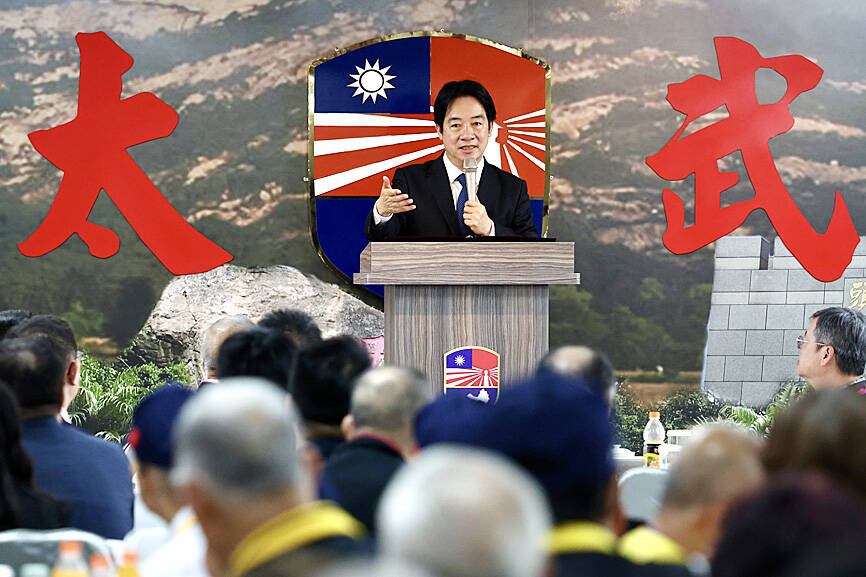Taiwan wants to continue its free way of life and rejects being ruled by the Chinese Communist Party, President William Lai (賴清德) said yesterday while visiting Kinmen County to mark a key battle with Chinese forces.
The Chinese military carried out another round of maneuvers around Taiwan as Lai was making the comments, underscoring what Taipei says are Beijing’s efforts to undermine regional peace and stability.
The scene of fighting during the height of the Cold War, the China Coast Guard since February has conducted regular patrols around Kinmen following the death of two Chinese on a motorboat as it fled from a Coast Guard Administration vessel.

Photo: Ann Wang, Reuters
On his first trip to Kinmen since taking office in May, Lai laid a wreath and bowed in respect at a memorial park for the 66th anniversary of the start of the Second Taiwan Strait Crisis.
The 1958 crisis was the last time Taiwanese forces battled with China on a large scale.
In August of that year, Chinese forces began more than a month of bombardment of Kinmen and Lienchiang County, including naval and air battles, seeking to force them into submission.

Photo: Ritchie B. Tongo, EPA-EFE
Taiwan fought back with support from the US, although the crisis ended in a stalemate.
Taiwan observes Aug. 23 every year as the date it fended off the Chinese attack.
Addressing veterans at a lunch and speaking off the cuff, Lai said he grew up with stories of the battle, as his uncle served in Kinmen.
Taiwan must resist China’s threats, Lai added.
“Our aim is that we hope for peaceful development across the Taiwan Strait. Taiwan is a country that ardently loves peace. Taiwan’s people are kind,” he said.
“We are no longer trying to retake the mainland [China], but we are also unwilling to be ruled by the Communist Party. We want to continue a life of democracy, freedom, human rights and rule of law. Right?” Lai added, to shouts of “yes.”
Shortly after Lai returned to Taipei, the Ministry of National Defense said it had detected 27 Chinese military aircraft operating in the Taiwan Strait yesterday, carrying out a “joint combat readiness patrol” with Chinese warships.
It did not give an exact location.
Taiwan sent its own forces to keep watch, the ministry said, using its usual wording for when China carries out such activities.
The ministry reports almost daily Chinese People’s Liberation Army aerial and naval missions around Taiwan.
The Chinese Ministry of National Defense did not immediately respond to a request for comment on whether the latest combat patrol was related to Lai visiting Kinmen.
Lai, speaking to the veterans and their families, said that the government continues to strengthen and spend more on the military and would defend the nation’s sovereignty.
Taiwan’s defense spending is to rise 7.7 percent next year, outpacing expected economic growth, as it adds fighter jets and missiles to boost its deterrence against Beijing.
Chinese Nationalist Party (KMT) Legislator Jessica Chen (陳玉珍) wrote on social media yesterday that her home of Kinmen should “not become a war zone.”
“The two sides of the Taiwan Strait need peace,” Chen said, having met Song Tao (宋濤), the head of China’s Taiwan Affairs Office, in Beijing on Thursday to discuss reopening Kinmen County to Chinese tourists.

The Central Election Commission has amended election and recall regulations to require elected office candidates to provide proof that they have no Chinese citizenship, a Cabinet report said. The commission on Oct. 29 last year revised the Measures for the Permission of Family-based Residence, Long-term Residence and Settlement of People from the Mainland Area in the Taiwan Area (大陸地區人民在台灣地區依親居留長期居留或定居許可辦法), the Executive Yuan said in a report it submitted to the legislature for review. The revision requires Chinese citizens applying for permanent residency to submit notarial documents showing that they have lost their Chinese household record and have renounced — or have never

A magnitude 5.6 earthquake struck off the coast of Yilan County at 12:37pm today, with clear shaking felt across much of northern Taiwan. There were no immediate reports of damage. The epicenter of the quake was 16.9km east-southeast of Yilan County Hall offshore at a depth of 66.8km, Central Weather Administration (CWA) data showed. The maximum intensity registered at a 4 in Yilan County’s Nanao Township (南澳) on Taiwan’s seven-tier scale. Other parts of Yilan, as well as certain areas of Hualien County, Taipei, New Taipei City, Taoyuan, Hsinchu County, Taichung and Miaoli County, recorded intensities of 3. Residents of Yilan County and Taipei received

Taiwan has secured another breakthrough in fruit exports, with jujubes, dragon fruit and lychees approved for shipment to the EU, the Ministry of Agriculture said yesterday. The Animal and Plant Health Inspection Agency on Thursday received formal notification of the approval from the EU, the ministry said, adding that the decision was expected to expand Taiwanese fruit producers’ access to high-end European markets. Taiwan exported 126 tonnes of lychees last year, valued at US$1.48 million, with Japan accounting for 102 tonnes. Other export destinations included New Zealand, Hong Kong, the US and Australia, ministry data showed. Jujube exports totaled 103 tonnes, valued at

BIG SPENDERS: Foreign investors bought the most Taiwan equities since 2005, signaling confidence that an AI boom would continue to benefit chipmakers Taiwan Semiconductor Manufacturing Co’s (TSMC, 台積電) market capitalization swelled to US$2 trillion for the first time following a 4.25 percent rally in its American depositary receipts (ADR) overnight, putting the world’s biggest contract chipmaker sixth on the list of the world’s biggest companies by market capitalization, just behind Amazon.com Inc. The site CompaniesMarketcap.com ranked TSMC ahead of Saudi Aramco and Meta Platforms Inc. The Taiwanese company’s ADRs on Tuesday surged to US$385.75 on the New York Stock Exchange, as strong demand for artificial intelligence (AI) applications led to chip supply constraints and boost revenue growth to record-breaking levels. Each TSMC ADR represents